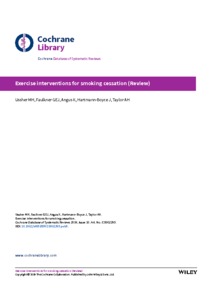Ussher, MH; Faulkner, GEJ; Angus, K; Hartmann-Boyce, J; Taylor, AH
(2019)
Exercise interventions for smoking cessation.
Cochrane Database Syst Rev, 2019 (10).
CD002295.
ISSN 1469-493X
https://doi.org/10.1002/14651858.CD002295.pub6
SGUL Authors: Ussher, Michael Henry
![[img]](https://openaccess.sgul.ac.uk/111548/1.hassmallThumbnailVersion/Ussher_et_al-2019-Cochrane_Database_of_Systematic_Reviews.pdf)  Preview |
|
PDF
Published Version
Available under License ["licenses_description_publisher" not defined].
Download (815kB)
| Preview
|
Abstract
BACKGROUND: Taking regular exercise, whether cardiovascular-type exercise or resistance exercise, may help people to give up smoking, particularly by reducing cigarette withdrawal symptoms and cravings, and by helping to manage weight gain. OBJECTIVES: To determine the effectiveness of exercise-based interventions alone, or combined with a smoking cessation programme, for achieving long-term smoking cessation, compared with a smoking cessation intervention alone or other non-exercise intervention. SEARCH METHODS: We searched the Cochrane Tobacco Addiction Group Specialised Register for studies, using the term 'exercise' or 'physical activity' in the title, abstract or keywords. The date of the most recent search was May 2019. SELECTION CRITERIA: We included randomised controlled trials that compared an exercise programme alone, or an exercise programme as an adjunct to a cessation programme, with a cessation programme alone or another non-exercise control group. Trials were required to recruit smokers wishing to quit or recent quitters, to assess abstinence as an outcome and have follow-up of at least six months. DATA COLLECTION AND ANALYSIS: We followed standard Cochrane methods. Smoking cessation was measured after at least six months, using the most rigorous definition available, on an intention-to-treat basis. We calculated risk ratios (RRs) and 95% confidence intervals (CIs) for smoking cessation for each study, where possible. We grouped eligible studies according to the type of comparison, as either smoking cessation or relapse prevention. We carried out meta-analyses where appropriate, using Mantel-Haenszel random-effects models. MAIN RESULTS: We identified 24 eligible trials with a total of 7279 adult participants randomised. Two studies focused on relapse prevention among smokers who had recently stopped smoking, and the remaining 22 studies were concerned with smoking cessation for smokers who wished to quit. Eleven studies were with women only and one with men only. Most studies recruited fairly inactive people. Most of the trials employed supervised, group-based cardiovascular-type exercise supplemented by a home-based exercise programme and combined with a multi-session cognitive behavioural smoking cessation programme. The comparator in most cases was a multi-session cognitive behavioural smoking cessation programme alone. Overall, we judged two studies to be at low risk of bias, 11 at high risk of bias, and 11 at unclear risk of bias. Among the 21 studies analysed, we found low-certainty evidence, limited by potential publication bias and by imprecision, comparing the effect of exercise plus smoking cessation support with smoking cessation support alone on smoking cessation outcomes (RR 1.08, 95% CI 0.96 to 1.22; I2 = 0%; 6607 participants). We excluded one study from this analysis as smoking abstinence rates for the study groups were not reported. There was no evidence of subgroup differences according to the type of exercise promoted; the subgroups considered were: cardiovascular-type exercise alone (17 studies), resistance training alone (one study), combined cardiovascular-type and resistance exercise (one study) and type of exercise not specified (two studies). The results were not significantly altered when we excluded trials with high risk of bias, or those with special populations, or those where smoking cessation intervention support was not matched between the intervention and control arms. Among the two relapse prevention studies, we found very low-certainty evidence, limited by risk of bias and imprecision, that adding exercise to relapse prevention did not improve long-term abstinence compared with relapse prevention alone (RR 0.98, 95% CI 0.65 to 1.47; I2 = 0%; 453 participants). AUTHORS' CONCLUSIONS: There is no evidence that adding exercise to smoking cessation support improves abstinence compared with support alone, but the evidence is insufficient to assess whether there is a modest benefit. Estimates of treatment effect were of low or very low certainty, because of concerns about bias in the trials, imprecision and publication bias. Consequently, future trials may change these conclusions.
| Item Type: |
Article
|
| Additional Information: |
Copyright © 2019 The Cochrane Collaboration. Published by John Wiley & Sons, Ltd. This review is published as a Cochrane Review in the Cochrane Database of Systematic Reviews 2019, Issue 10. Cochrane Reviews are regularly updated as new evidence emerges and in response to comments and criticisms, and the Cochrane Database of Systematic Reviews should be consulted for the most recent version of the Review. Ussher MH, Faulkner GEJ, Angus K, Hartmann-Boyce J, Taylor AH. Exercise interventions for smoking cessation. Cochrane Database of Systematic Reviews 2019, Issue 10. Art. No.: CD002295. DOI: 10.1002/14651858.CD002295.pub6. |
| Keywords: |
Cognitive Behavioral Therapy, Exercise, Randomized Controlled Trials as Topic, Recurrence, Smoking [psychology] [*therapy], Smoking Cessation [*methods], Weight Gain, Humans, 11 Medical and Health Sciences, General & Internal Medicine |
| SGUL Research Institute / Research Centre: |
Academic Structure > Population Health Research Institute (INPH) |
| Journal or Publication Title: |
Cochrane Database Syst Rev |
| ISSN: |
1469-493X |
| Language: |
eng |
| Dates: |
| Date | Event |
|---|
| 30 October 2019 | Published | | 16 October 2019 | Accepted |
|
| Publisher License: |
Publisher's own licence |
| Projects: |
|
| PubMed ID: |
31684691 |
| Web of Science ID: |
WOS:000493915900045 |
 |
Go to PubMed abstract |
| URI: |
https://openaccess.sgul.ac.uk/id/eprint/111548 |
| Publisher's version: |
https://doi.org/10.1002/14651858.CD002295.pub6 |
Statistics
Item downloaded times since 07 Jan 2020.
Actions (login required)
 |
Edit Item |



